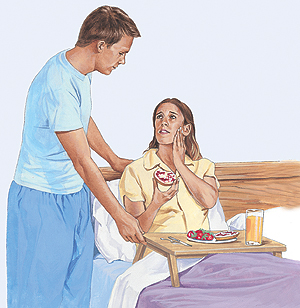Understanding Temporomandibular Disorders (TMD)
Do you have pain in your face, jaw, or teeth? Do you have trouble chewing? Does your jaw make clicking or popping noises? These symptoms can be caused by temporomandibular disorders (TMD). This term describes a group of problems related to the temporomandibular joint (TMJ) and nearby muscles. Your symptoms may be painful and frustrating. But don't worry. Your healthcare team can help you treat TMD and prevent future problems.
What's Wrong?
 TMD causes many kinds of symptoms. That's part of the reason it can be hard to diagnose. You may have headaches, tooth pain, or muscle aches. Your pain may be constant. Or it may come and go without any apparent reason. TMD-related problems include:
TMD causes many kinds of symptoms. That's part of the reason it can be hard to diagnose. You may have headaches, tooth pain, or muscle aches. Your pain may be constant. Or it may come and go without any apparent reason. TMD-related problems include:
What Can You Do?
If you are having TMD symptoms, don't wait. Call your dentist or primary care doctor right away. You don't have to live with pain or discomfort. TMD can be treated. In fact, a key part of treatment is learning to manage your condition at home.
Which Treatment Is Right for You?
Treatment helps rest the muscles and joint. It also helps relieve symptoms and restore function. Depending on the type of problem you have, your treatment plan may include:
-
Temporary diet changes.
-
New habits for managing stress and maintaining the health of your jaw.
-
Medication to reduce pain and inflammation.
-
Therapy to reduce pressure on the joint and restore function.
-
Dental treatment to reduce pressure on the joint.
How Can You Avoid Future Problems?
Treatment can help relieve your current condition. But TMD symptoms may return over time. You can avoid future problems by maintaining the health of your jaw:
-
Avoid foods and habits that make your symptoms worse.
-
Lower the stress level in your life.
-
Follow your treatment plan.
-
Pay attention to your body and get help if symptoms recur.






